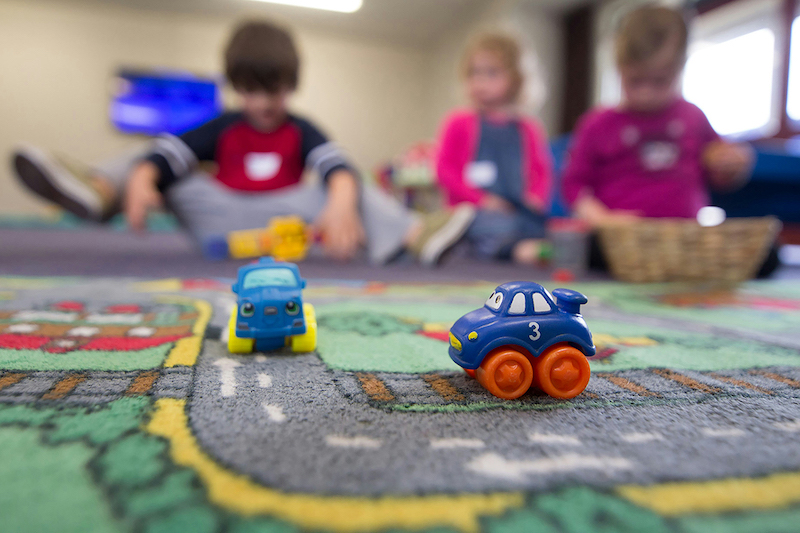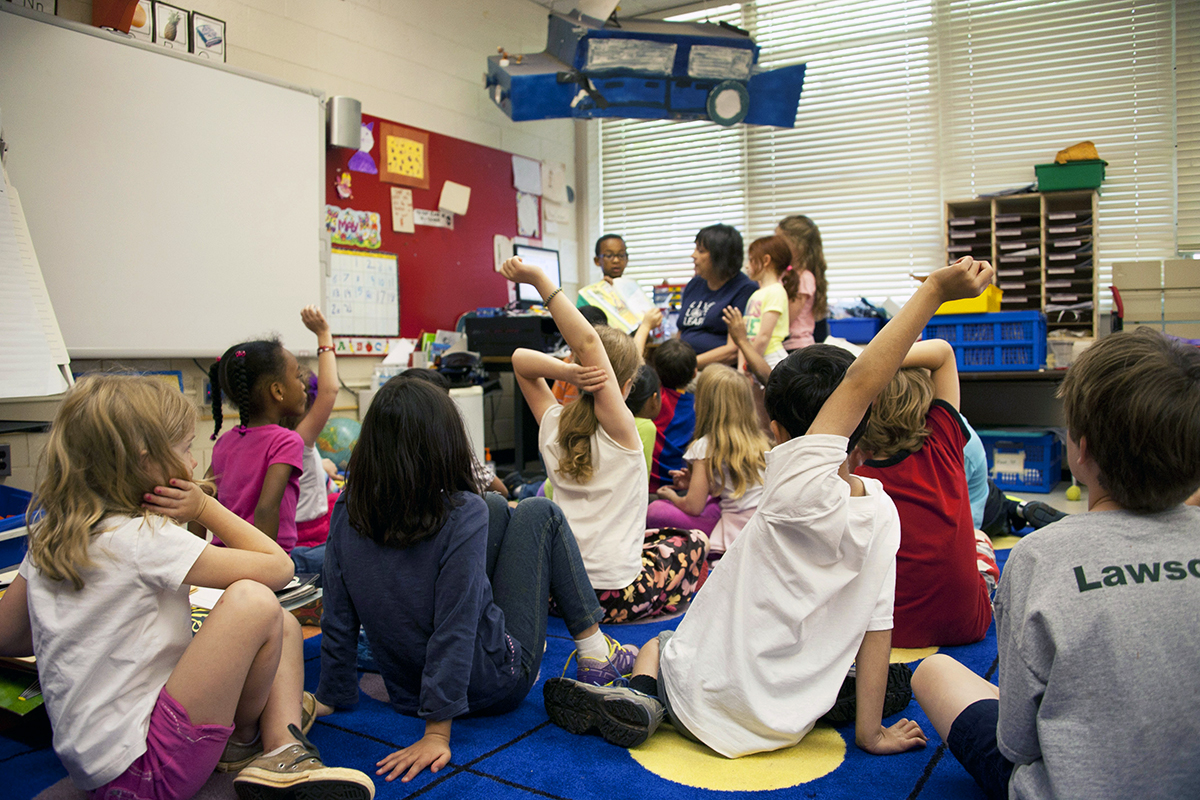In the U.S., compulsory schooling begins in either kindergarten or first grade, depending on where you live. This means that is the point where you have to enroll your child in school (or register for some type of homeschooling). Before that, parents are not required to send their child to school and, importantly, the government is not required to provide schooling.
More and more, however, individual municipalities — cities, towns — have been offering school earlier. Pre-K, starting at either age 3 or 4, has become increasingly common. There are a lot of reasons for this. Providing “universal pre-K,” as this is sometimes called, can theoretically help lower inequality in school, by making sure that all kids have similar exposure to learning concepts before they hit school age. Parents generally like universal pre-K options.
Universal pre-K is not without its detractors, though. One source of debate is the question of whether pre-K is actually good for kids. I wrote more about that here, and the thrust of the literature is that yes, it is. A second issue is that it’s expensive for the government to provide. Providing free child care costs money, and one may question whether that is the right use of funds.

There is a new paper out, by several economists, that speaks to this whole debate but especially to the second part of it. Broadly speaking, the paper looks at the impact of universal pre-K on parent earnings rather than child outcomes, and asks whether providing this service increases paid parental work and whether that then makes it more cost-effective. (The answer is yes.)
I wanted to discuss this in depth for two reasons. First, this is an important policy issue for parents, and whether we like it or not, thinking about the cost of social programs matters for which ones the government should do. Second, I cannot resist doing a little teaching. I often complain about papers that generate correlations and not causality. Here’s a chance to see a method where we can be more confident about causal conclusions.
Understanding the study
The setting for the paper is New Haven, Connecticut (my hometown!), which is a relatively poor school district in which the majority of students are not white. New Haven offers some universal pre-K through its schools, for kids who are 3 and 4. The program is very good. It offers 6.5 hours per day of high-quality educational instruction. In addition, there is wraparound child care, so children can be dropped off as early as 7:30 and picked up as late as 5:30. The program, including (at most sites) the wraparound child care, is free.
A lot of the work in producing this research likely went into getting the data. The authors have information on which children are in these pre-K programs, their later scores in school, and their parents’ earnings, among other things. Putting together a dataset like this, including linking children to parents, is quite challenging. It’s also boring to discuss, so let me say here just that it looks like they did a good job.
If we’re interested in looking at the impact of pre-K on these various outcomes, a first instinct you might have is that the researchers could simply compare the outcomes for kids and families who were in the pre-K program with those who were not. However, this will not work. The kids who enroll in this pre-K are going to be systematically different from those who don’t — their families will be different, resources will be different — and all you could get out of this comparison is a correlation, not a causal effect. Based on this simple comparison, we couldn’t make the statement we want, which is: Providing universal pre-K would be expected to change this outcome by [this much].
What the authors do to get to a causal relationship is they use the fact that these pre-K programs are oversubscribed. More kids want to go to them than there are slots available, and the way that New Haven decides who gets in is with a lottery. That is, there is some component of random choice in who is able to go to these programs. What the authors can effectively do, then, is compare the “winners” of the lottery with the “losers.” Because the lottery is random, the winners and losers are on average identical other than that one group got into the pre-K program and one did not.
There are many more technical details in this paper, but that’s the basic idea — the core identification strategy, to use the technical term. And using that strategy, the authors are able to look at whether pre-K matters, and how.
Why universal pre-K is good for parents
Winning the lottery to enroll in the pre-K program increases child care hours by about 11.3 hours per week. This is the first result, and it serves to confirm that the program increased child care. Given the data the authors see, they cannot map out exactly where these hours come from. However, it seems like most of the effect is parents being able to access more hours of care than they were before.
Turning to outcomes, the authors begin with kids. Here, they do not find any evidence that kids’ test scores or other school performance metrics are improved by this program. This finding is roughly in line with a number of other papers, especially in a setting like this where the alternative for many kids is another pre-K program. Many other papers have shown that the benefits to pre-K are largest when we consider much later outcomes, like high school graduation, which this paper cannot consider.
When it comes to parents, the program really matters. The headline finding is that enrollment in universal pre-K raises parents’ earnings by about 20%. This is a low-income population, with average yearly earnings of around $34,000, making this a sizable and very important income boost. Some of this comes from an increase in the chance of working at all (which goes up by six percentage points), and some is from an increase in earnings for parents who work. On average, parents work about an extra 12 hours per week, closely in line with the increase in the number of hours of child care available.
It is perhaps not surprising that parents work more when child care is easier. What is most striking about these results, though, is that the earnings gains persist through about six years at a similar level. In other words, parents whose kids are able to enroll in this pre-K show 20% higher earnings even years later, once their kids (and all the other kids) are in school. This is true even though once kids are in school, all parents work the same number of hours on average.
The authors interpret this finding as an effect of career continuity. Parents whose kids have access to reliable, high-quality child care in the pre-K period are more likely to work during that period, and they work more hours. This extra work allows them to get on a steeper career path. This means that even though everyone eventually ends up working the same number of hours, the group that was able to invest in their career early have higher wages and therefore more income.
The final exercise in the paper is to consider the “value” of the program to the government. This is an important exercise because it helps policymakers figure out how to spend scarce resources. If you have a million dollars to spend, what is the most cost-effective way to spend it? In order to make decisions like this, policymakers need a way to compare programs. A common metric is the marginal value of public funds for the program. Put simply, this is a measure of the value of the program relative to its cost to the government. The authors calculate these figures for this program and compare the numbers to other uses of government funding.
What they find is that if we focus only on kids, these universal pre-K programs are less valuable than other things we spend money on for kids (like overall investments in schools, child health care, etc.). However, in thinking about the parents, universal pre-K is an extremely efficient program. It looks from these data like it would be more efficient to invest in it than in more traditional routes for increasing labor supply, like job training or expansions of the Earned Income Tax Credit.
In the end: from an economic standpoint, the biggest value to universal pre-K may be that it helps parents return to the labor force and make a better life for their families in the short and long run. And of course, that’s also good for kids.
How this study should influence policy
I like this paper a lot, but I also think it’s very important for the policy conversation. So often, when we talk about programs that serve parents and families, we think about them too narrowly. When we talk about child care subsidies in general, we can quickly fall into language that makes these seem like entitlements, or like gifts to parents that are at the expense of others.
What this paper makes clear is that at least some of these “soft” or “parent-focused” policies should be thought of instead as policies that focus on jobs and the labor market. The final result in this paper says, basically, that universal pre-K is a more efficient way to increase labor supply than job training programs, which are a staple of most labor policy.
I don’t think this is surprising for, say, parents. Providing families with high-quality child care that goes from 7:30 in the morning to 5:30 in the evening if they need it — of course that makes it easier to have a job. But putting numbers on it, and discussing it in the context of policies that do not seem like parental gifts … this matters for the discourse.
The policy takeaway is clear: if you were not convinced about universal pre-K because of the value for kids (which most of the literature suggests is there), you should be convinced of the value to parents and to the economy overall.
The bottom line
- Universal pre-K has long been understood to be beneficial for children. But a new study finds that universal pre-K is also good for parents: enrollment in universal pre-K raises parents’ earnings by about 20%.
- The results of this study should impact policy decisions — UPK is good for parents, kids, and the economy.

















Log in
One more reason to love public pre-k!
2 points:
First, in WA the compulsory age for starting school is 8/3rd grade. Last remaining state that isn’t 5 or 6 I believe.
Second, one thing I forgot to say on the recent survey is that I no longer get notifications when people “like” or respond to my comments. I remember in the old system getting an e-mail. So if someone responds to this comment, I’ll probably never know, as I likely won’t come back to check this particular thread.
There is one impact that is dramatically overlooked when looking at universal prek and that is it’s impact to daycare providers. Ages 0-2 are very expensive to care for in a daycare setting where 2-4 ages offset the cost the 0-2 ages. If universal prek would be offered, it would significantly decrease revenue for anyone in the childcare industry, raising weekly rates for 0-2 parents, and making childcare very expensive. Our rural towns are already facing this and child care centers/daycares are already struggling to find alternatives.
It’s funny that this post is called “why universal prek means parents make more money,” but the thing that enabled the high quality research is that the program is NOT actually universal (because it’s oversubscribed parents have to go through a lottery, meaning parents cannot be assured of access). This, IMHO is a big challenge with the prek research, because the highest rigor evaluation methods all rely on some kind of shortage of access or constrained supply, but that then means you cannot study the impact of some smothered benefits of a truly universal program (eg if parents knew for sure they would have access to prek would we see even greater labor market impacts because parents could take that into account in planning; does making sure all kids have a common baseline of prek experience enable changes in kindergarten and elementary curricula that build lasting educational gains, etc.) the possible exception is RDD designs, but that is a topic of its own heated debates. It would be interesting to randomize jurisdictions to a truly universal treatment but almost certainly not politically, fiscally or operationally feasible and very hard to get adequate n size.
Stupid autocorrect! I meant hypothesized benefits, not smothered!
Came here to say the same thing – this isn’t “universal “ pre-k. This is lottery-based randomly-assigned pre-k. Universal would mean everyone has access. Like schooling. Agree with the overall point, that it’s good for parents and we need it, but let’s be clear in the language.
A lot of this presupposes two-working-parent households being good, but a society that prioritizes taking mothers out of the home and letting other adults raise their kids in order to make more money is a very sick society that is not serious about raising children well.
I don’t think anyone is prioritizing mothers being taken out of the home. This would just make it possible for both partners whether it’s mom or dad (or same sex partners as well) to be able to continue working if that’s what they want. My mom loved her job in the 80’s when I was born but couldn’t afford to pay for childcare and had to quit her job. She adapted and was happy to be with us but I wish she had had more options available so she could have continued to enjoy her very fulfilling work while also enjoying being fulfilled as a mom. Universal pre-k would just give parents more options and I’m sure many moms (or dads) might still choose to stay home but at least there would be options. In many families both parents need to work to support their families as well.
Why does this not prioritize taking fathers out of the home?
Why are you assuming a good society is one that requires mothers (only mothers apparently, according to you) to stay home with children?